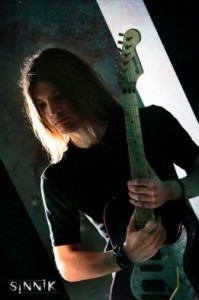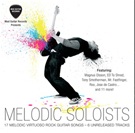What is improvisation and how to develop your skills in it (Part A)
 As an old joke put it, improvisation is what the orchestra members do when the score falls off their music stands during a performance. Yet, instead of tempting you to sabotage your local orchestra by throwing their sheets all over the place, I will try to answer this tricky question in a significantly less destructive manner. In fact, I was wondering this very question myself when as a kid I was seduced by the howling menace of the electric guitar solos. However, since my background was then purely classical, I couldn’t put my finger on any remotely satisfactory answer.
As an old joke put it, improvisation is what the orchestra members do when the score falls off their music stands during a performance. Yet, instead of tempting you to sabotage your local orchestra by throwing their sheets all over the place, I will try to answer this tricky question in a significantly less destructive manner. In fact, I was wondering this very question myself when as a kid I was seduced by the howling menace of the electric guitar solos. However, since my background was then purely classical, I couldn’t put my finger on any remotely satisfactory answer.
Actually, to my knowledge , improvisation remains largely untouched in today’s classical world, being a sadly ignored subject in its education. I find this is seriously detrimental since all major composers and virtuosos of the Baroque era and beyond (J.S.Bach, W.A.Mozart, L.v.Beethoven, Fr. Liszt, etc.) were famous for their improvisational skills. In fact, they used them as a tool for the development of their compositions.
It’s widely-known that in the concertos of the classical and romantic eras, the solo player also had to perform an improvisational part of his/hers, called cadenza. However, in the vast majority-if not totality- of today’s performances, the cadenzas played are written beforehand.
Ok, end of parenthesis. Let me begin by clarifying what improvisation is most certainly not. One common misunderstanding, especially among non musicians is that improvisation is just playing freely something unwritten and on the spot. This is half the truth and sounds like somebody is playing totally by chance. Were it true, it would save (especially) the jazz musicians from tons of rehearsing and practicing time and headache.
The fact that improvising musicians come up with theirs solos on the spot however is true and hence at first it seems a mystery how a musician does that. Also, the former does not explain how one can achieve it and what he/she is thinking while improvising.
So, what does improvising mean? A definition that could cover a wide range of styles from jazz and fusion to blues and rock is the following: improvising means composing spontaneously over a given chord sequence, based on short lines you have practiced before. I suppose this might not fully cover free or free jazz genres but it will certainly work for the aforementioned ones. What really surprised me when I first realized that, was how my favorite jazz giants developed such beautiful, fresh and every time different melodies based on a repeating chord sequence.
Therefore, a natural, supplementary question that comes after this would be: what does a player need in order to develop his/her improvisational skills? Would it be adequate to just practice and learn some lines (a.k.a. licks) and then try to fit them over a chord sequence? I actually tried that at a pretty young age. Yet, even when I came across a well matching combination (which took ages given my then primitive ignorance), I couldn’t understand the exact reason(s) why this happened. As a result to that, hardly could I come up with more lines that would fit the same chord progression, create variations of them and fit them over different chord progressions. So, what do we need in order to hone our improvisational skills?
First of all-sorry for the bad news- Music theory. My apologies, fellow musicians but in the rarest exception that somebody is a music genius so big that compared to them Beethoven would sound a hopelessly talentless amateur, they definitely need to learn some deal of music theory. Even in the case when one discovers (or actually stumbles over) something with no prior knowledge of theory, I can assure you that had he/she studied the theory involved, he/she would learn it in much less time and understand it more thoroughly.
Why is this? Well, unlike what the common sense whiningly suggests, music theory is not simply a set of arbitrary rules, learned by heart so as to successfully pass the conservatoire exams. In fact, it is the only thing that can provide you with a set of very useful tools and the vocabulary that will for one help you understand the logic behind chord patterns and their function among many other things.
Actually, what music theory can provide you with is such a huge subject that would take several articles (if not volumes) on its own. Yet, as you can easily understand even if it only assisted us in identifying chord types, what works well over them and why, still it would be vital for the development of all our music skills.
Further more, a sound knowledge of music theory can consequently help us understand the other players’ approach, decipher their personal style and analyze their thinking process, thus contributing to the shaping and enrichment of our own musical «rationale» and vocabulary.
Secondly, a good ear (OK, no comparisons with Beethoven here), which is mainly cultivated by ear training and transcribing. Don’t worry if you believe you don’t have this skill or that this is something you are born with. Being tone deaf is staggeringly unlikely and the way somebody can understand what he/she is hearing has mostly to do with how his/her brain is trained to interpret sounds.
With good practice it all gets better. Of course, this holds true except for the unfortunate cases of some hearing impairment. Personally, apart from my conservatoire’s ear training courses I have also used several books and software applications. I’ve come to the conclusion that a combination of as much material as possible is mandatory because this subject is too broad to be covered by just one book, program or course.
Oh and for some more bad news…ear training pre-supposes a sound knowledge of theory and it in turn helps us a lot to understand music theory to a greater depth . Don’t worry though, despite what many people believe, you don’t need to have perfect pitch in order to become a good improviser although it would surely help. The development of a good relative pitch is what our main practicing aim should be.
Now, in case you are not familiar with transcribing, this is what all our idols did in order to build their personal style. Picking their favorite players’ solos by ear. Literally however, transcribing means to write down what you hear, but just playing it by ear and maybe writing down your favorite licks would suffice in most cases. This will enrich your lick vocabulary as well so I’d recommend you don’t neglect it, tempted by today’s endless lick resources (for more on that, check also: Is it possible to master more than one style? ).
Well, as I already told you the subject of improvisation is vast and therefore we will need another part to complete this brief outline. So stay tuned and see you soon with the next part on this exciting subject.
About the author : SinniK Al is a Cardiff based electric guitarist, widely known for his work with SlavEATgoD, I Bow Candles and Seduce The Heaven. Currently, he’s recording SlavEATgoD’ s sophomore record and preparing his solo instrumental record and I Bow Candles ‘ sophomore record. He is endorsed by 39 custom guitars
© 2013 SinniK Al










